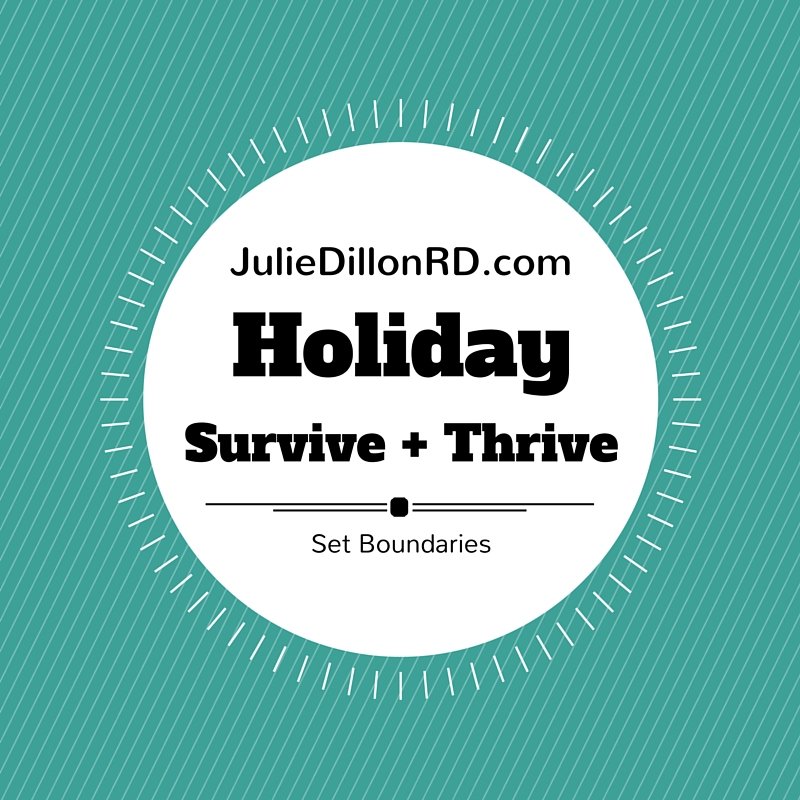Is it holiday season already? I just put away our Halloween decorations, and we’re already knee deep in holiday drama. I’m not talking about the Cup-gate controversy, but rather, the emotional toll that holiday experiences have on those struggling with eating and weight concerns.
Over the next few months, I’ll be blogging about how to experience the holidays in a way that protects your eating recovery and sanity. Before we even get to dishing about food, let’s discuss how to set up your holidays to prevent eating difficulties and protect yourself when times get challenging.
Setting up healthy boundaries can be tough for anyone, but by learning how to make the boundaries stick, you can put your eating at ease. Consider these boundary options and get the ball rolling now. Preplanning will make them easier to keep.
You have permission to pick and choose which holiday events to attend
Do you feel overwhelmed from the pressure to attend two Thanksgiving or Christmas dinners? Do you wish you could spend a holiday at home instead of at someone else’s place? At this time of the year, a time that is associated with merriment and food, you may find yourself fixated on your eating and/or body image. Sometimes binge-eating, over-exercising, and other disordered eating behaviors are ways that your psyche communicates unmet needs or minimized feelings. Stop and pay attention. There’s a message that you need to hear. The following link may help you recognize when you’re getting stuck in this type of eating disorder behavior rut: click here.
Eating disorder behaviors are a white flag of surrender, gently nudging you to set a boundary. For example, your desire to stay home with close family or friends is just as important as distant Aunt Edna wanting you to be at her home. Your needs are just as important as anyone else’s. Even more, not meeting your needs may be behind your disordered eating and negative body image.
It is okay to say No to holiday invitations. Choosing to meet your needs by setting an event boundary is not self-ish- it’s self-care.
You have permission to decide the timetable at the events
Do you find hanging out with certain family members or friends feels okay, or even enjoyable – for a little while? You may notice that the first few hours are fun and feel safe.
When do things get chaotic? When do the family arguments escalate? Looking back at past holiday events, consider how long it took for things to go from fun to unbearable. Do you remember what caused you to want to leave – and how long after you got there it happened? This is your time boundary.
This year, stay 10 minutes less than that time boundary. It’s okay to shorten how long you visit with family and friends.
You have permission to choose what you put on your plate
Do you attend two Thanksgiving dinners, yet feel the pressure to eat full meals at both? This year, decide to let your body decide how much to eat. While setting this boundary, expect that some people may try to get you to eat more or make you feel guilty for not eating more as if the amount you eat is an insult to the host.
For example, if you attend two Thanksgiving dinners, plan to attend one for the main meal and the second for dessert. The hosts will appreciate prior notice of your plans, and it will help you honor your boundaries. While eating the main course and you’re offered seconds, it’s okay to say, “Thank you, but I’m looking forward to dessert at Grandma’s house in a bit.” If they keep pushing, try “Thank you, and I appreciate you taking the time to prepare this incredible meal, but instead of eating more now, can I wrap some up to take home?”
What if they still keep pushing? Evelyn Tribole, RD, author of Intuitive Eating, suggests being a “broken record”. Keep repeating your set boundary – and don’t back down.
What if, instead of pushing more food, you hear concerns about eating too much? Health trolls, often well meaning, may think that they know the best food choices for you. I encourage you to try the “broken record” here too. Just say, “Thank you for your concern, but I really want another helping.” YOU are the expert of your body. Letting others decide what’s best for you crosses an important boundary.
You have permission to choose to respond, if at all, to body commentary and diet talk
I have a sign hanging in my home that let’s people know that body disparagement and diet talk are not tolerated there. We also do not tolerate racial slurs. These areas are firm boundaries that we, as a family, have decided to have zero tolerance for in our home and around our children.
There are other areas that we choose to tolerate or not. This may depend on who is speaking or if I’ve had my morning coffee yet. I encourage you to decide, before the holidays, which topics on eating and weight you’ll tolerate, and set this as your boundary. You may choose to further break this down, based on who is making the statements, where it’s being made and the situation in which the statement was made.
It’s okay to not want to hear how others experience your body shape. It’s also okay, at times, for you to let it go and just ignore it. Maybe other times you’d like to respond. You get to decide.
Do you need help with how to respond to body comments or diet-talk? Check out Ragen Chastain’s Dances with Fat blog and, especially, this particular post where she deals with inappropriate comments.





